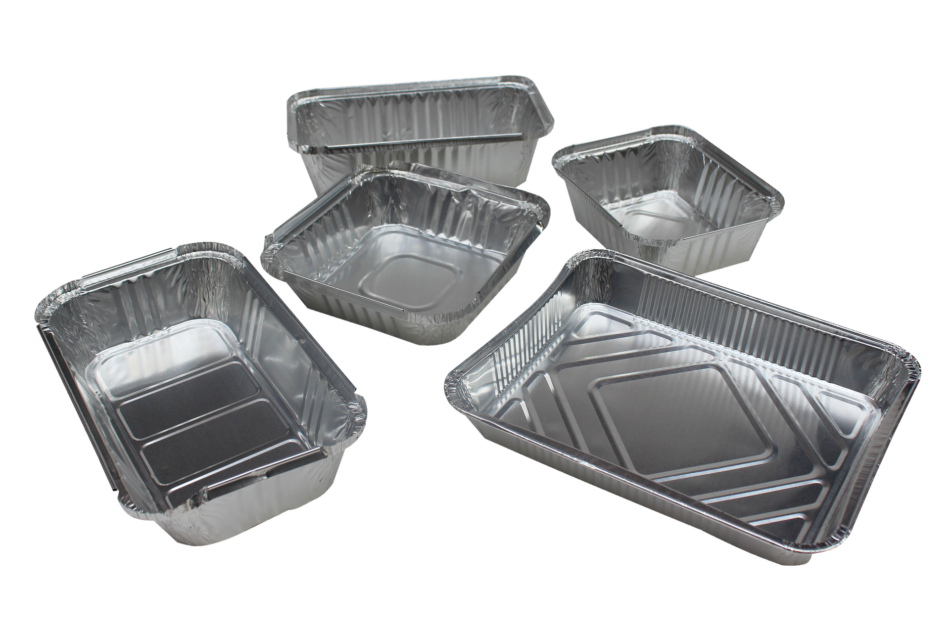Prepare Your Business for New Food Waste Legislation in the UK
From 31 March 2025, most UK businesses must arrange separate food waste collections. Learn and prepare for the new food waste legislation in the UK.

Aluminium trays are used for both commercial and personal purposes in high volumes around the UK. Whether you’re packing your lunch for work or preparing takeaway orders, they play an integral part in many industries and walks of life. Aluminium foil trays must be stored and recycled effectively after use.
As such a common item, it’s important you understand how to dispose of and recycle aluminium trays. Learn more about recycling aluminium and foil trays with our answers to your commonly asked questions below.
Used aluminium trays are a form of metal waste, which are often produced in large volumes within the packaging and manufacturing industries. This means they’re recyclable alongside other types of metal waste. In fact, aluminium is widely considered the ‘most recyclable’ metal because it can be recycled infinitely without losing any of its effectiveness.
Aluminium is not manmade. However, it is a rare metal due to how it’s formed and refined. This means that upon its introduction to the market in around 1859, the price of aluminium exceeded that of gold.
However, as extraction processes developed and we could gain easier access to aluminium, it began to crop up in products more often. It was first used to create packaging containers, such as aluminium trays, in 1948.
Aluminium trays are made from a particularly thick form of aluminium foil. They sometimes come with a paper or cardboard lid.
To create aluminium foil and trays, molten aluminium is placed in a rolling mill, creating slabs. The thickness of this slab varies depending on the kind of product being made. These slabs are cooled, then sent to a cold rolling mill. Here it’s rolled to the desired thickness and is sometimes double layered to prevent breakage. Finally, the foil is moulded into trays.
Yes, aluminium is one of the most recyclable materials in the world. It’s 100% recyclable, so every bit of an aluminium can, foil, or tray is reused during the process. Aluminium is also infinitely recyclable – meaning it can be recycled endlessly without losing any of its quality.
Aluminium should be recycled as it’s easy and efficient. Compared to creating new aluminium from scratch, recycling aluminium products uses only about 5% of the energy and emissions. This is much more cost-effective and better for the planet. Aluminium foil trays are widely used, so there’s lots of the material ready to recycle too.
Aluminium trays can be disposed of alongside the rest of your dry mixed recycling. This means you don’t need to use a specific bin for used aluminium trays. However, some businesses use different containers for each waste type (such as one bin for metal recycling to store the foil tray, and another for paper recycling for the paper lid).
When disposing of aluminium trays in any type of bin, you should ensure that:
Once your metal waste is collected, it will be taken to the appropriate waste recycling facility for treatment. Here, the following process occurs:
As recycling aluminium trays is so straightforward, their usage is often promoted over other forms of single-use packaging. However, there are few alternatives out there that you may consider to try and become more sustainable within your business practices.
You could use plastic or glass containers and trays that can be cleaned and used repeatedly – saving the energy required for recycling. Alternatively, you could use eco-friendly food wraps to store food products.
While many of us are quick to throw away or recycle aluminium trays after use, once cleaned, they can be repurposed in various ways. For example, if you find it challenging to remove built-up grease on kitchen supplies and utensils, scrunched up aluminium could help you banish these stubborn stains for good. They can also be used for non-food storage.
Furthermore, if you have fancy silverware in your drawers, wrapping them in aluminium between uses can help keep them looking great for longer. That’s because aluminium slows down the rate at which metal deteriorates.
As aluminium is one of the easiest products to recycle, the costs of recycling and disposal aren’t as high as you may think. This is because it can be collected alongside the rest of your recycling and doesn’t need to undergo any specialist treatment in the way hazardous waste does.
Simply ensure you use a licensed waste carrier and that products are stored in the appropriate bins before collection. At Business Waste, we can help you cut costs in all areas of waste management – by providing you with free bins for your aluminium recycling and putting together an effective waste management plan.
According to the Aluminium Association, around seven billion aluminium trays or containers are produced annually worldwide. This equates to approximately 220 foil trays per second being created around the world.
While the exact figures are unclear for how many aluminium trays are sent to landfill, a recent study by Friends of the Earth claims as little as 12% of aluminium based products are recycled appropriately – and are instead sent to landfill sites.
A few more facts about aluminium tray use, disposal, and recycling include:
Typically, you can dispose of your aluminium trays alongside the rest of your recyclable waste at home. However, you can also dispose of them free of charge at:
Find out more about other rubbish streams.
Get a fast FREE quote for your aluminium tray waste
From 31 March 2025, most UK businesses must arrange separate food waste collections. Learn and prepare for the new food waste legislation in the UK.
The study participants included business owners and company employees, revealing unexpected findings about corporate environmental practices.